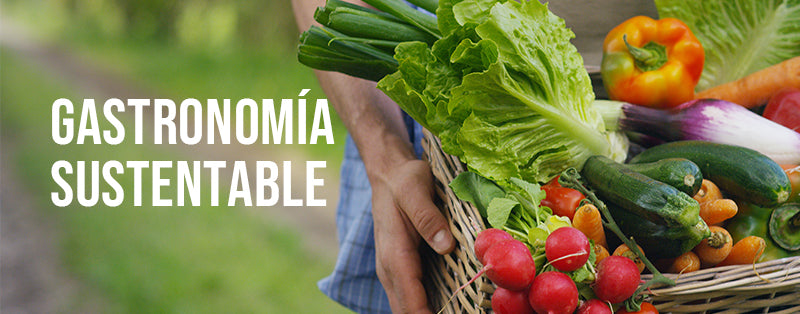
Sustainable gastronomy, what is it?
Share
Sustainable gastronomy is synonymous with cuisine that takes into account the origin of the ingredients, how they are grown and how they reach our markets and, finally, our plates, according to the definition of the World Health Organization.
The United Nations General Assembly established June 18 as Sustainable Gastronomy Day to celebrate gastronomy as a cultural expression of the world's natural and cultural diversity.
Sustainable gastronomy aims to promote habits (production, preparation and consumption) that are careful with the environment and local traditions, since sustainable gastronomy conceives regionally prepared dishes as an expression of the culture of each place.
It also promotes agricultural development, food security, nutrition, sustainable food production and the conservation of biodiversity.
We can all contribute to preserving the culinary traditions of our localities with some actions such as:
Make a list of the foods and quantities that you will need when cooking, in order to make the most of the ingredients. If you have any left over and it is possible, keep it as much as you can, it can always be useful to prepare another dish.
Likewise, take care of the portions, check the expiration dates and take advantage of the leftovers of the dishes you prepare. You can make it reheated or a buffet on the weekend with all the leftovers. This way you don't waste ingredients or any other resources in the kitchen.
Planning the foods you are going to consume during the day or week will help you buy only what is necessary to prepare your dishes, thus avoiding buying more and then throwing it away because it has gone bad.
It also helps you better plan your food budget and keep your personal finances more organized.
Buying and consuming seasonal fruits, vegetables and legumes is a way to take care of the environment and respect culinary customs.
In this way, the land yields better for agriculture, since trying to plant and harvest products out of season can ruin the fertility of the cropland.
Keep recipes from where you live current, as they are generally sustainable by requiring ingredients from the region. Additionally, consider that the gastronomy of your area is part of its cultural heritage, it is an expression of its history and its roots.
If possible, buy directly from small producers and farmers in the area where you live, because in addition to preventing their crops from being lost, it strengthens your local economy. Do not haggle when buying products from farmers where you live, prices must be fair both for you as a consumer and for the farmers for the work and resources invested in the production of the food you are purchasing.
If possible, get involved in asking for better conditions and more support for farmers: remember that sometimes their products do not receive the payment that all their work truly deserves.
Each region has its particular products. Part of the adventure of traveling is discovering other flavors, other recipes that may not be available in your place of origin. This way you will understand more about the culture of the place you visit and help its economy.
Products like those from The Functional Foods are made from natural organic ingredients such as monk fruit , adaptogenic mushrooms and other superfoods , which implies that the farming process was taken care of not only to ensure the quality of the products but also that the cultivation and harvest were environmentally friendly .

